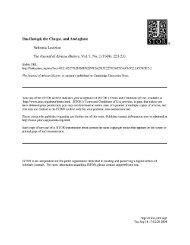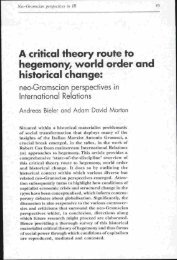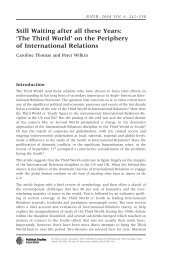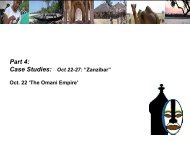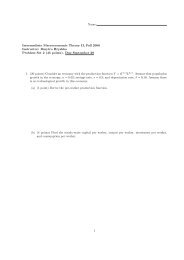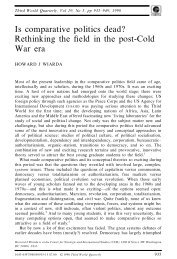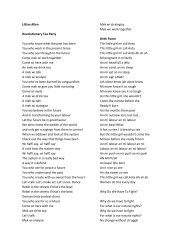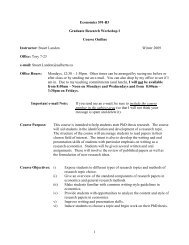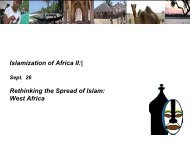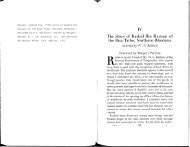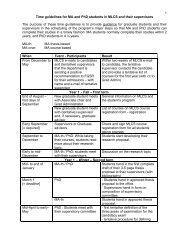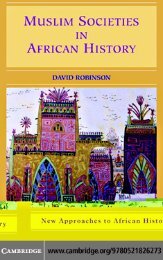personal memories revolutionary states and indian ocean migrations
personal memories revolutionary states and indian ocean migrations
personal memories revolutionary states and indian ocean migrations
You also want an ePaper? Increase the reach of your titles
YUMPU automatically turns print PDFs into web optimized ePapers that Google loves.
University Press, 1995), especially 90-96 <strong>and</strong> Amal N. Ghazal, “Power, Arabism <strong>and</strong> Islam in the<br />
Writings of Muhib al-Din al-Khatib in al-Fath,” Past Imperfect 6 (1997): 133-150.<br />
13 Hourani, for example, chronicles the history of Arabs from the rise of Islam until modern time but<br />
completely dismisses the history of Arabs beyond the Maghrib-Mashriq paradigm. See Hourani, A<br />
History of the Arab Peoples. Moreover, the discussion of marginality in Middle Eastern studies, for<br />
example, has not taken into account marginality of geography but rather social marginality in<br />
Foucauldian terms. See Eugene Rogan, ed. Outside In: On the Margins of the Modern Middle East (London<br />
& New York: I. B. Tauris, 2002).<br />
14 For example, Ali Merad, in his seminal work on the Islamic reform movement in Algeria between<br />
1925 <strong>and</strong> 1940, devotes no more than three pages on the role Ibadis played in that movement. See<br />
idem, Le reformisme musulman en Algèrie de 1925 à 1940: essai d’histoire religieuse et sociale (Paris: Mouton et<br />
Co., 1967), 222-225. Muḥammad ‘Alī Dabbūz, however, makes the case for a more significant role of<br />
Ibadis in the modern history of Algeria, especially their role in the reformist anti-colonial movement.<br />
See Muḥammad ‘Alī Dabbūz, Nahḍat al-jazā‘ir al-ḥadītha wa thawratuhā al-mubāraka (Algeria: al-Maṭba‘a<br />
al-Ta‘āwuniyya, 1965).<br />
15 A similar notion of the conformity between Arab <strong>and</strong> African history is expressed by Alamin M.<br />
Mazrui <strong>and</strong> Ibrahim Noor Shariff, The Swahili: Idiom <strong>and</strong> Identity of an African People (Trenton: Africa<br />
World Press, 1994). In discussing the Swahili identity, for example, they consider its Arabocentric<br />
paradigm as “merely a subset of the Afrocentric paradigm.” Ibid., 9.<br />
16 Not every Africanist, of course, shares this view. Ali al-Mazrui for example, in his documentary <strong>and</strong><br />
book The Triple Heritage of Africa, highlights the integral role of Islam <strong>and</strong> Arabs in African history <strong>and</strong><br />
argues for their essential part in the African ‘heritage’. See idem, The Triple Heritage of Africa. His views,<br />
however, are not adopted by other Africanists whose definition of African history is not as inclusive as<br />
Mazrui’s. A different view <strong>and</strong> a different definition are implicitly invoked by Henry Louis Gates, Jr. in<br />
idem, Wonders of the African World (New York: Alfred A. Knopf, 1999).<br />
17 This abbreviated definition of African history <strong>and</strong> African geography is even reflected in a recent<br />
study of Islam in Africa. While Egypt <strong>and</strong> North Africa are presented as ‘gateways’ to Africa, Africa<br />
itself is divided into West Africa <strong>and</strong> the Sudan, <strong>and</strong> Eastern <strong>and</strong> Southern Africa. See Nehemia<br />
Levtzion <strong>and</strong> R<strong>and</strong>all L. Pouwels, eds., The History of Islam in Africa (Athens: Ohio University Press,<br />
2000).<br />
18 The same applies to the group identified as ‘Swahili’ who, for long, remained ‘unrecognized’ by<br />
academics as a category of Africans <strong>and</strong> were deemed unworthy of their attention. See the<br />
introduction to James de Vere Allen, Swahili Origins: Swahili Culture <strong>and</strong> the Shungwaya Phenomenon<br />
(London: James Currey, 1993). The notion that the ‘Swahili’ is not pure ‘African’ on account of the<br />
different color, language, <strong>and</strong> intermixing with Arabs still persists today <strong>and</strong> has reappeared in the<br />
statement of Henry Louis Gates, Jr. in his controversial documentary Wonders of the African World,<br />
when he said the following: “It has taken my people 50 years to move from being Negro to being<br />
black, to being Afro-American. How long is it going to take the Swahili to become African?” Gates, Jr.<br />
Wonders of the African World, 152. Ali A. Mazrui criticized Gates for practicing a form of Orientalism,<br />
that the former called “Black Orientalism”. Mazrui’s initial response can be found at Ali A. Mazrui, A<br />
“Preliminary Critique of the TV Series by Henry Louis Gates, JR,” West Africa Review, 1(2000). His<br />
second reply can be found at Ali A. Mazrui, “Black Orientalism: Further Reflections on ‘Wonders of<br />
the African World,’ ” West Africa Review 1 (2000).<br />
19 Francis B. Pearce, Zanzibar: The Isl<strong>and</strong> Metropolis of Eastern of Eastern Africa, 1 st. ed, 1920 (New York:<br />
Barnes & Noble, 1967), 214. Pearce’s racial categorization <strong>and</strong> definition, as outlined in his book,<br />
reflected the British mind at the time. His account became a reference to researchers who took that<br />
categorization for granted.<br />
20 Ibid., 215.<br />
21 Mazrui <strong>and</strong> Shariff, The Swahili, 28.<br />
22 Ibid., 29.<br />
23 Pearce, Zanzibar, 221.<br />
24 William H. Ingrams, Zanzibar: Its History <strong>and</strong> Its People, new imp., (London: Frank Cass, 1967), 204.<br />
25 Comorians gained that status in 1939. See Fair, Pastimes <strong>and</strong> Politics, 45-46. Pearce included Mshihiri<br />
or Shihiris (Arabs from Hadramaut) <strong>and</strong> Comorians in the category of ‘Arabs’ but made a clear<br />
distinction between them <strong>and</strong> “the most numerous <strong>and</strong> important section of the Arab race in the<br />
Sultanate,” in reference to Arab Omanis. Pearce, Zanzibar, 216.<br />
26 Ingrams, Zanzibar, 194-5.<br />
27 Institutionalizing privileges was neither exclusive to British colonialism nor confined to a hierarchy<br />
of races. The French in Syria <strong>and</strong> Lebanon adopted a similar pattern that allocated more privileges to<br />
men than to women, to Lebanese than to Syrians, to Christians than to Muslims. See Elizabeth<br />
http://web.mit.edu/cis/www/mitejmes/<br />
55



